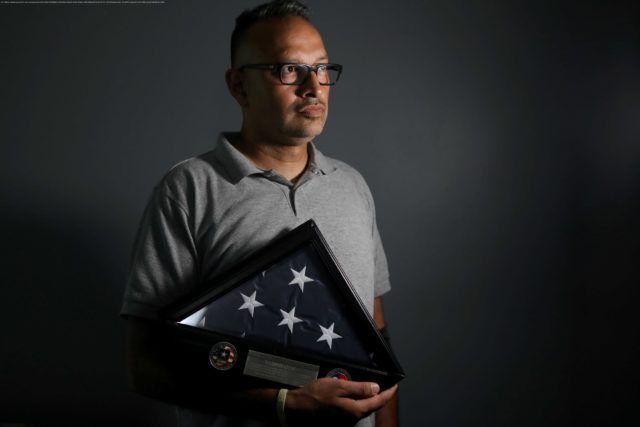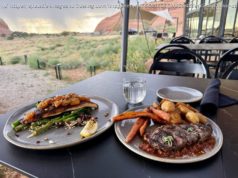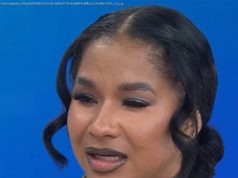Maysoon Zayid gained fame as a stand-up comic and actor seen on the daytime soap „General Hospital.“ Yet she still gets death threats “all the time. …
Maysoon Zayid gained fame as a stand-up comic and actor seen on the daytime soap „General Hospital.“ Yet she still gets death threats “all the time.” Farhaj Hassan served in the Iraq War with the U.S. Army but later was so horrified by police spying on Muslim citizens that he sued the NYPD. Amani Al-Khatahtbeh, frustrated by stereotypes and media bias, started her own online platform so Muslim women could tell their own stories. For American Muslims who grew up in the shadow of 9/11, the last 20 years have been a time of contradictions — pride and fear, harassment and suspicion, solidarity and resistance. They mourned the attack on their country but also endured a rising tide of Islamophobia, no-fly lists, the „Muslim ban“ and stereotyping. The USA TODAY Network interviewed influential Muslim Americans about the lasting impact of the 2001 attacks. For most, it was a turning point, shaping their journeys as artists, activists, politicians and performers. They described being taunted by classmates, having their homes egged, seeing neighbors detained by the FBI. Did 9/11 permanently change life in the US? More Americans say so than ever before 20 years later: How a vision for the 9/11 Memorial blossomed into a piece of New York’s everyday fabric Anti-Muslim bias continues today, but what has changed is how the generation that came of age after 9/11 has responded. Cast as „other,“ they were determined to take back the narrative of their faith, their lives and their place in America. They rued being typecast in film as either villains or victims and how they were expected to censor their speech or onstage acts. Now, they are influencing a wider audience as culture makers, elected officials and civic leaders. Here are their stories, in their own words: Editor’s note: These excerpts have been edited for space and clarity. Zayid is an actor, comedian, writer and disability advocate. On 9/11: Since the ’90s, Arabs have been vilified in movies. We played terrorists. We played taxi drivers and belly dancers. But I didn’t realize, being born and raised in America, watching the towers fall, being as terrorized as everyone else in my neighborhood, I would be treated differently because I am Muslim, because I am Arab. Shortly after 9/11, I met my partner in comedy crime, Dean Obeidallah [the comedian and SiriusXM radio host]. He said, „Let’s do an Arab comedy show to combat the negative images of Arabs and Muslims in media.“ That was the first time I was like, „Oh, I can actually use my comedy for good.“ On being a Muslim celebrity: I get death threats all the time. I live in a country where Islam is so vilified that people sit at home and go, „You know who I’m going to kill? The Muslim funny disabled chick.“ The future: I think things are changing because Muslims are getting involved in every aspect of public life. I think it’s changing because we have people like Rashida Tlaib in Congress. We have Keith Ellison as an attorney general [in Minnesota]. There are Muslim comics, incredible Muslim Olympians. We have become such a part of the mainstream fabric that I think that we are beating the stigma, we are breaking the stereotypes. The Ohio-born Ali brothers are storytellers and filmmakers who made the acclaimed 2020 documentary „Two Gods.“ On 9/11: Aman: I was a junior in high school. It was toward the end of the day and a kid stood up and said, „We should bomb Afghanistan until it glows.“ And I confronted him. „Yeah, let’s go after who did this, but why should we bomb an entire country, any country, for what a group of people did?“ He goes, „I bet it was you. It was probably your dad flying that plane, wasn’t it?“ I don’t think we fully understood at the time. It created an inferiority complex like, „We’re not good enough to be here,“ even though we’re born and raised in this country, that we’re not welcome and me self-censoring myself initially: Don’t be too loud because they might see you as too angry, or don’t do this, they may see you as this. Zeshawn: Teenage-hood and adulthood was always tainted by this air of feeling like I was being watched out of like the corner of somebody’s eye. Or needing to be good but not great, so that way I wouldn’t be targeted. I quieted myself in many sorts of ways. A lot of my personality is very sort of low-key and I sort of blend into the background, but I do think that was a survival tactic. Hate crimes: Zeshawn: The mosque we grew up in was vandalized in Ohio. I’ll never forget. We found out the news on my 12th birthday. We saw news footage on the local news and I remember just being like, „Well my birthday is ruined.
Start
United States
USA — Art 'Breaking stereotypes': How 9/11 shaped a generation of Muslim Americans






